
Countdown 1… Waddell
December 14 @ 7:30 pm - 9:30 pm
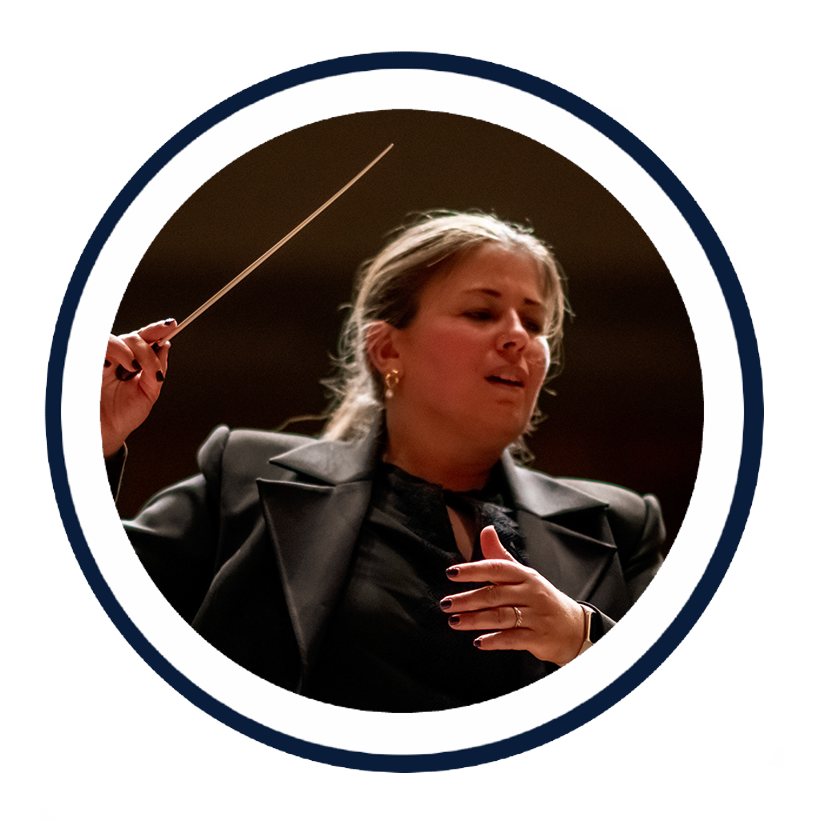
At this festive concert, you will hear the last of the four candidates* being considered as GBS’ new Music Director: Guest Conductor Rachel Waddell.
Themed “Story-Telling Time,” this concert is thrilling, enlightening and family-friendly all at once. Prokofiev’s Peter and the Wolf featuring special guest narrator Jamie Bernstein along with Rimsky-Korsakov’s Sheherazade to anchor the evening, which will also highlight the musical version of ‘Twas the Night Before Christmas and a new piece by Chickasaw composer Jerod Tate: Chokfi.
Rachel L. Waddell, an American conductor, has garnered acclaim for her innovative concert programming, commitment to new music, education, and collaboration. She was named a finalist for the American Prize’s 2019 Vytautas Marijosius Memorial Award in Orchestral Programming due to her outstanding concert programs. Rachel serves as the newly appointed Director of Orchestras at Colorado State University. Previously she was the Director of Orchestral Activities and Assistant Professor with the Arthur Satz Department of Music at the University of Rochester in New York. She has conducted orchestras around the world and in August 2022 she made her Vienna debut conducting Così fan tutte as part of the Vienna Opera Academy.
In July 2023 she made her Canadian debut with the Orchestre Métropolitain, after being selected to conduct by Yannick Nézet-Séguin at Le Domaine Forget de Charlevoix. Rachel’s interest in the constantly evolving role and responsibility of orchestras within their communities led her to co-found Conductors for Change, Inc., a 501(c)(3) for anyone reimagining the future of the American orchestras.

Meet our Narrator (Peter and the Wolf) JAMIE BERNSTEIN
Jamie Bernstein is an author, narrator, director, broadcaster, and filmmaker. Her 2018 memoir, Famous Father Girl, is about growing up with composer-conductor Leonard Bernstein, and pianist and actress Felicia Montealegre in an atmosphere bursting with music, theatre and literature. Jamie has written and narrated concerts about Mozart, Aaron Copland, and Stravinsky, as well as “The Bernstein Beat,” a family concert about her father modeled after his groundbreaking Young People’s Concerts. She appears worldwide performing her own scripted narrations as well as standard concert narrations, such as Copland’s “A Lincoln Portrait” and her father’s Symphony No. 3, “Kaddish.” Jamie has produced and hosted the New York Philharmonic’s live national radio broadcasts, as well as many summer broadcasts from Tanglewood. She recently narrated the podcast “The NY Phil Story: Made in New York.” Jamie is the co-director of Crescendo: the Power of Music, an award-winning documentary film focusing on children in struggling urban communities, who participate in youth orchestra programs for social transformation. Jamie’s articles and poetry have appeared in such publications as Symphony, Town & Country, and Opera News. She also edits “Prelude, Fugue & Riffs,” a newsletter pertaining to her father’s legacy.

Meet our Narrator (‘Twas the Night Before Christmas) ANTHONY WELLMAN
Long time friend of GBS Anthony “Tony” Wellman has numerous television and radio commercials, corporate videos and radio programming in his CV, and has interviewed hundreds of business owners for American Express commercials. He’s also done voice over work for the World Almanac, ASME, Random House, DK publishing, General Electric, Audio Book Club, and others. Tony has co-hosted The Dick Cavett Radio Show and is annually a live announcer for many trade events since 2007. GBS fans may remember him best from his narratives of la Boheme at GBS’ December 2016 Holiday Concert. Tony is also a fixture at GBS events where his stentorian voice is in demand as host.
Program Notes
December 14, 2024
Rachel Waddell, Guest Conductor
Jamie Bernstein, Narrator
Anthony Wellman, Narrator
Chokfi’ for String Orchestra and Percussion (2018) Jerod Tate (b. 1968)
Peter and the Wolf Sergei Prokofiev (1891-1953)
‘Twas the Night Before Christmas Bill Holcombe (1924-2010)
INTERMISSION
Scheherazade (1888) Nikolai Rimsky-Korsakov (1844-1908)
Op. 35
Please join us at the Cross Aisle (Row K, Main Level) after the concert for a Q and A with Maestra Rachel Waddell.
The GBS welcomes you and wishes you the happiest of holiday seasons. Our program this evening includes two beloved, well-known masterpieces, an exquisite setting of a favorite Christmas poem, Clement Moore’s immortal The Night Before Christmas and a new piece composed in 2018.
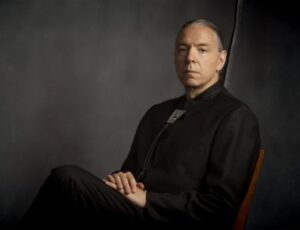
Jerod Tate is a composer and citizen of the Chickasaw Nation in Oklahoma, dedicated to the development of American Indian classical composition. He is a 2022 Chickasaw Hall of Fame inductee and a 2022 Distinguished Alumni Award recipient from The Cleveland Institute of Music. In 2021, he was appointed a Cultural Ambassador for the U. S. Department of State. Among many recent premieres, Tate’s highlights include commissions from the New York Philharmonic, American Composers Orchestra, Cantori NY and Turtle Island Quartet. Tate is a three-time commissioned recipient from the American Composers Forum, a Chamber Music America Classical Commissioning Program recipient, a Cleveland Institute of Music Alumni Achievement Award recipient, a governor-appointed Creativity Ambassador for the State of Oklahoma and an Emmy Award-winner for his work on the Oklahoma Educational Television Authority documentary The Science of Composing. His music was also featured in the HBO series Westworld. His middle name, Impichchaachaaha’, means “their high corncrib” and is his inherited traditional Chickasaw house name. Tate’s Chokfi for String Orchestra and Percussion was commissioned by the Oklahoma Youth Orchestras, and premiered on May 6, 2018. Says the composer:
Chokfi’ (choke-fee) is the Chickasaw word for rabbit, who is an important trickster legend within Southeast American Indian cultures.
Inspired by a commission for youth orchestra I decided to create a character sketch that would be both fun and challenging for the kids. Different string and percussion techniques and colors represent the complicated and diabolical personality of this rabbit person.
In honor of my Muscogee Creek friends, I have incorporated a popular tribal church hymn as the melodic and musical base.
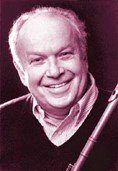 This unique experience is followed by Bill Holcombe’s setting of Clement Clark Moore’s The Night Before Christmas. Holcombe was an arranger and composer of music for films, recording dates and symphony orchestras and a performer on saxophones, clarinet, and flute. He studied composition and flute at the University of Pennsylvania and The Julliard School. Notably, he was a staff arranger and player for the Tommy Dorsey Band. He also played for Metro-Goldwyn-Mayer at their New York radio station, WMGM, as well as in Broadway pits. Listen for your favorite carols incorporated into this fun piece!
This unique experience is followed by Bill Holcombe’s setting of Clement Clark Moore’s The Night Before Christmas. Holcombe was an arranger and composer of music for films, recording dates and symphony orchestras and a performer on saxophones, clarinet, and flute. He studied composition and flute at the University of Pennsylvania and The Julliard School. Notably, he was a staff arranger and player for the Tommy Dorsey Band. He also played for Metro-Goldwyn-Mayer at their New York radio station, WMGM, as well as in Broadway pits. Listen for your favorite carols incorporated into this fun piece!
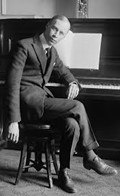 Prokofiev loved children’s imaginative nature, and children enjoyed his making them laugh. His beloved Peter and the Wolf was part of a collaboration with Natalia Satz, director of the Moscow Childen’s Musical Theater. After they discussed the project, Prokofiev wrote the original story. As a composer working in the Soviet Union, Prokofiev needed to observe certain pieties. Tim Munro points out that:
Prokofiev loved children’s imaginative nature, and children enjoyed his making them laugh. His beloved Peter and the Wolf was part of a collaboration with Natalia Satz, director of the Moscow Childen’s Musical Theater. After they discussed the project, Prokofiev wrote the original story. As a composer working in the Soviet Union, Prokofiev needed to observe certain pieties. Tim Munro points out that:
At the center is “pioneer” Peter. Pioneers were Russian boy scouts, but had a political edge: joining the pioneers was the first stepping-stone to becoming a member of the Communist party, a required rite of passage. Even so, Prokofiev’s story doesn’t line up with any political belief system. Peter is curious and strong-willed. His world is small, but he isn’t afraid to challenge authority. His goal is simple: to right the wrongs he sees in the world.
Prokofiev wrote detailed notes in English and Russian, telling us that an instrument symbolizes each character: the bird by a flute, the duck by an oboe, the cat by a clarinet playing staccato in a low register, the grandfather by a bassoon, the wolf by three horns. Additionally, all instruments played Peter, and the hunters were symbolized by the timpani and bass drum. This piece is a wonderful introduction, for all ages, to the contrasting colors of the orchestra. According to Prokofiev, “If you listen very carefully at the end of the story, you’ll hear the duck quacking inside the wolf’s belly, because the wolf in his hurry had swallowed her alive.”
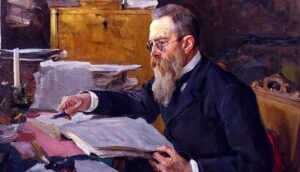 I am indebted to Hugh McDonald for excerpts from his excellent notes on Rimsky-Korsakov’s masterful Scheherazade.
I am indebted to Hugh McDonald for excerpts from his excellent notes on Rimsky-Korsakov’s masterful Scheherazade.
The “Mighty Handful,” the group of five forward-looking Russian composers of which Rimsky-Korsakov was the youngest member, were particularly suspicious of such techniques as fugue and counterpoint, as taught in Germany, and they argued that it was more instructive to listen to peasants singing than to professors teaching. So it is ironic that without ever losing his interest in folk music, Rimsky-Korsakov became one of the great teachers of his generation, in charge of composition at the St. Petersburg Conservatory from 1871 until 1905.
Scheherazade, his largest orchestral work, is carefully constructed, full of melody and brilliantly orchestrated. In addition, it evokes the exotic world of sultans and harems whose popularity spread widely with the Arabian 1001 Nights. These tales were known in Europe since the 18th-century, but were most enthusiastically read during Rimsky-Korsakov’s time when they were adapted for all forms of entertainment.
Although the suite’s four movements give it some resemblance to a symphony, Rimsky-Korsakov wanted a freer intermingling of speeds and themes than would have been normal in a symphony, so he brings back his tunes at will. Most obviously, he assigns the voice of Scheherazade herself to a solo violin, whose obsessive doodling on a group of shapely themes recurs throughout, often signaling a change of tempo and mood that transitions into a new story. There are images of Sinbad’s ship tossing on the waves, an echo of Rimsky-Korsakov’s years as an officer in the Imperial Russian navy. The stern resolution of the Sultan is heard at the beginning in an angular unison theme that prominently features the trombones. Although Rimsky-Korsakov mentioned in his autobiography certain episodes illustrated in the music, he ultimately preferred his listeners to think of the work as a more general evocation of the stories, since characters from different stories appear across movements.
The first movement is largely taken up by a gentle rocking theme, with some of the slippery key changes of which Rimsky-Korsakov was a master. The second movement presents a curly tune on a bassoon supported by four double-basses. This is passed around the woodwinds before more dramatic events intervene. The third movement is beautifully relaxed, free of such disturbances, while the finale brings back most of the themes, linked by frenetic movement as if for a dancing dervish. In the end a great sense of calm is restored, since Scheherazade has been spared and can now look forward to the permanently warm regard and patient ears of the Sultan Shahriah.
—Frank Martignetti, PhD
Sacred Heart University
This season, all kids under 19 years old will be admitted FREE when accompanied by an adult; accompanying adults will get 15% off their single ticket prices. Please note that our concerts will begin one half hour earlier this season, at 7:30 PM.